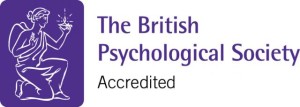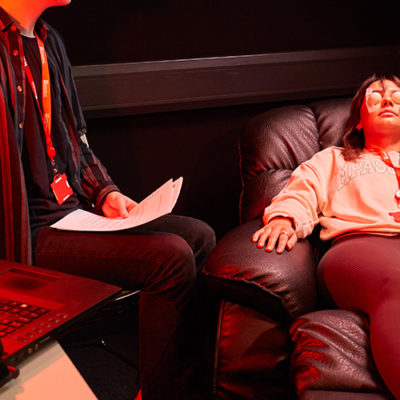
Rachel Maunder
Associate Professor in Psychology of Education
Psychology (Developmental and Educational) BSc (Hons)
DiscoverGet in touch with us as we may be able to offer you a place for September 2024 through Clearing.
UCAS Code
C891
Level
UndergraduateUG
BSc (Hons)Duration
Full Time: 3 Years
Foundation: 4 Years
Part Time: 4 - 6 Years
Starting
September
BBC at A Level
DDM at BTEC
Fees UK 24/25
Full Time: £9,250
Part Time: £1,540 per 20 credit module
Integrated Foundation Year: £9,250
Fees International 24/25
Full Time: £15,200
Integrated Foundation Year: £15,200
Location
For questions regarding study and admissions please contact us:
study@northampton.ac.uk
0300 303 2772
Our Developmental and Educational Psychology course is a specialist psychology programme that allows you to focus on human development and educational issues alongside a general psychology pathway. This course provides you with useful knowledge and experience if you intend to pursue a career in or outside psychology. The skills you will learn are transferable to a variety of fields including educational psychology, clinical psychology, teaching or research.
This developmental and educational Psychology course is British Psychological Society (BPS) accredited*, giving you the opportunity to gain Graduate Basis for Chartered (GBC) Membership. You will develop your employability skills through volunteering opportunities, events, workshops, research projects and work-based learning.
*Please note that this accreditation depends on achieving a minimum of 2:2 degree classification.

Updated 12/07/2024
This Psychology Developmental and Educational degree has been designed to contribute towards achieving the following United Nations Sustainable Development Goal: SDG3 Good Health and Wellbeing.
This educational and developmental psychology degree offers you:
Developmental and Educational Psychology are combined in this single honours BSc course to provide you with useful knowledge and experience needed to work in educational psychology, clinical psychology, teaching or research. This course offers you a unique springboard for further study or future training. It will help you to develop a range of transferable skills including analytical and research skills.
There are two clear strands to the psychology developmental and educational degree. The first strand covers general psychology in areas such as social, cognitive and biological psychology which underpin the specialist developmental and educational work. The second strand is comprised of specific developmental and educational modules. There will be work-based learning built into a module taken in each year of your course. You are also encouraged to seek additional work experience through paid employment or voluntary work.
If you are wishing to pursue a career in teaching, educational psychology or education related fields then this course will help you develop your knowledge and skills that can be transferred to these areas. However, you would not be restricted to career choices in these areas. The degree still enables you to access the full range of careers available to those studying the general Psychology course. This course is accredited by the British Psychological Society as conferring eligibility for the Graduate Basis for Chartered (GBC) membership, provided that you meet the minimum standard of a second class honours in your degree. This is the first step towards becoming a Chartered Psychologist, and allows you to pursue professional training in clinical, educational, forensic, sports and counselling psychology.
In stage one you will gain an introduction to the subject by studying the range of different psychological areas and different research approaches. The practical applications of psychology are also studied in the first year.
Stage one consists of six compulsory modules. The modules introduce the major theoretical approaches to understanding human behaviour. This includes biological approaches, cognitive psychology, developmental psychology and social psychology. There is also a focus on your skill development, and how psychology can be applied to improve people’s lives and well-being.
In the second stage the subject is studied in much more depth, both in the development of research skills and in the study of developmental and educational psychology.
Stage two provides a wide range of 20 credit modules allowing you to study the core areas of psychology in detail. All modules are compulsory.
After completing Stage two you are given the opportunity to undertake an optional Placement Year.
The third stage provides you with an opportunity to specialise in specific areas of psychology, both in terms of personal research and the selection of course modules. There are compulsory modules in Educational Psychology, Lifespan Development, and Child and Adolescent Mental Health. You will also be able to choose one module from Neuroscience of Mind, The Psychology of Mental Health and Applying Positive Psychology. You will also complete a dissertation on a topic of your choice within developmental and educational psychology.
Please note the modules shown here relate to the academic year 24/25. The modules relating to the academic year 25/26 will be available from June 2025.
A typical offer would be:
We welcome applications from students with a mix of A levels and BTEC/Cambridge Technical qualifications.
In addition, you will be expected to have achieved GCSE Mathematics at grade C/4 or above. Domestic equivalences are not accepted, apart from Access applicants who must take 12 credits of Maths Level 2 or 6 credits of Maths Level 3 as part of their Access course. International equivalences will be reviewed on application.
You will not need to have previously studied Psychology, although that will be considered an advantage.
The standard entry requirements for the Integrated Foundation Year are:
We welcome applications from students with a mix of A levels and BTEC/Cambridge Technical qualifications.
If you would like more information on how to make an application for the Psychology Developmental and Educational BSc, please visit our How to Apply page.
If you are an International student and would like more information on making an application, please visit our How to Apply page.
All International and EU students applying for a course with us must meet the following minimum English language requirements:
For information regarding English language requirements at the University, please see our IELTS page.
Fees quoted for the developmental and educational psychology degree relate to study in the Academic Year 24/25 only. They may be subject to inflationary increases in future years.
Fees quoted for the developmental and educational psychology degree relate to study in the Academic Year 23/24 only. They may be subject to inflationary increases in future years.
Costs associated with placements such as travel may be incurred throughout your studies depending on where you are based.
For information on the scholarships available to you, please see our scholarships page.
For more information about possible funding options, please visit our Fees and Funding pages.
At the University of Northampton, everything we do, from funded trips to paid internships, is to give you everything you need to make a difference when you leave.
If you join our full-time Psychology, education and development, degree at Northampton, you will receive a laptop when your course begins*. The laptops are built to a bespoke custom specification ideal for use in the seminar room, collaborative group work or studying at home.
Whatever your ambitions, we’re here to help you to achieve them. We’ll support you to identify the skills you’re learning during your course, find your strengths and secure practical experience so that when it comes to applying for jobs or further study you’ll feel confident in standing out from the crowd. We’ve created the Northampton Employment Promise because we are so confident that if you focus on your studies and complete one of our awards you’ll be highly employable by the time you graduate. Putting you in a great position to secure employment or continue your studies.
To check out the full list of perks, visit our Student Perks page or dedicated International Perks page.
* UK fee payers only (see Terms and Conditions for further details)
The Integrated Foundation Year (IFY) offers a new and exciting route into studying for a degree, attracting ambitious and driven students who are willing to learn and advance.
If you have non-standard qualifications or do not quite meet the admissions requirements we can offer you a fantastic opportunity to study a four-year programme that includes an Integrated Foundation Year. The Integrated Foundation Year will help you develop the theoretical/practical and academic skills you need to successfully progress to the full award.
Our four-year courses will enable you to successfully follow the degree pathway of your choice while gaining essential study skills. The foundation year of your chosen degree will be studied on a full-time basis and is aimed at supporting the transition to higher education. Years two, three and four are then studied as a standard degree programme.
Developmental psychology is the scientific study of changes that occur in humans over the lifespan and understanding how and why they happen. Educational psychology involves the application of psychological theory and research to understand learning and improve educational experiences. In the Psychology (Developmental and Educational) degree at The University of Northampton, you get to develop more specialised knowledge of these areas within your psychology programme.
With a psychology degree, you can specialise within different pathways and develop within an area of your choice in the field of psychology. Upon completion of this course, and depending on degree classification, you will be eligible for a British Psychological Society (BPS) Graduate Basis for Chartered Membership (GBC). This is the first step in pursuing professional training as an educational, clinical, counselling, occupational, health or forensic psychologist. You could pursue a career as an academic psychologist, conducting research and teaching in higher education. More information about psychology careers can be found on the BPS website.
However, within this Developmental and Educational Psychology course, you can also choose to follow various career paths outside of the psychological profession. The invaluable set of skills and knowledge base that psychology students gain throughout this course enables them to succeed in a range of careers.
The work-based elements of this programme provide valuable career based skills. As well as our annual Psychology Careers Event, at the University of Northampton, we also offer other volunteering opportunities through our Changemaker Hub, Employability Plus recognition, STEAM Opportunities and support from our careers team.
Our Developmental and Educational Psychology graduates have gone into a range of professions. These include educational psychology, clinical psychology, teaching, special educational needs, academic research, health (such as paramedic science, occupational therapy), mental health and early years provision.
No. Although this is a specialised Psychology degree, it still maintains all of the flexibility that you would have with a straight Psychology programme. The course is accredited by the British Psychological Society, meaning you are eligible for Graduate Basis for Chartered Membership (GBC) when you graduate (assuming you achieve a 2.2 or above). This means that you could go into any of the professional areas of psychology (as detailed on the BPS website).
In addition, the knowledge and skills you gain through a psychology degree are also valued in a range of careers outside of Psychology. Transferrable skills that you can expect to develop across the course include critical thinking, writing and computer literacy. You will also become an effective communicator in a variety of different channels with thorough and ethical research practices. These skills are transferable across many different careers and therefore gives you the opportunity to develop yourself towards any route you would like to pursue. This is one of the main draws for a degree in Psychology. The skills that are acquired are widely applicable to many careers, so you are not limited to just working within psychology.
The Psychology (Developmental and Educational) programme is a pathway degree. This means that it follows the backbone of a standard Psychology degree but enables students to specialise in their chosen area of the subject along the way. You will cover all the core curriculum of a Psychology degree that is needed to meet the professional accreditation requirements, but you also get to study specialist modules in the field of developmental and educational psychology in each stage of the programme. You will be part of a smaller cohort of students studying this specialist pathway, and there are bespoke modules you take just for this route. Other modules will be taken alongside other Psychology students. This means you get the best of both worlds. You get to experience doing a Psychology degree and all that this involves, but you also will also be part of a group of students who have a specific interest in developmental and educational psychology and want to study these aspects in more depth.
The Developmental and Educational Psychology route here at the University is between 3-6 years, depending on your availability to study. This gives you the time to develop a foundational knowledge of psychology and appropriate research skills and develop towards the areas that are of interest to you. You will also have the time and support to explore career opportunities and areas of expertise, alongside our staff team.
Yes. The Developmental and Educational Psychology programme has work-based learning opportunities incorporated into each stage of the degree. During stage one, there is a short work experience placement in an educational setting to complete as part of a module assessment. This is expanded in stage two where you undertake a slightly longer educational work-based experience. In stage three, there is a module with an extensive applied experience in an educational setting. We also run an optional placement year, between stages two and three, giving you the opportunity to strengthen career skills alongside your degree, should you so wish.
Teaching methods on the Psychology Development and Educational course include an innovative, active blended approach to learning. These methods make the acquisition of knowledge more dynamic and flexible for students than ever before. This involves face-to-face seminars, tutorials, practical or laboratory workshops and computer assisted learning. Independent and group work will be supplemented with online seminars, self-directed learning and virtual tasks.
You are encouraged to actively engage and participate with your course material both online and in class discussions to further enhance your learning. This includes a willingness to complete independent study alongside attending your classes. Practical work represents an important component of the educational and developmental psychology course in each of your three years of study. Throughout the course, you are exposed to different research approaches and will develop an ability to apply both quantitative and qualitative techniques to research questions. We have extensive online resources that support face-to-face contact in class.
You are taught by experienced, well-qualified staff that are experts within their disciplines. Staff in the Subject Group are active researchers, producing research that is nationally and internationally recognised.
A variety of assessment strategies are used at each level to ascertain your level of competence in a range of academic and transferable skills. These strategies include essays, practical reports, multiple-choice tests, oral presentations, time-constrained essays, seen and unseen examinations, critical reviews, group project work, patchwork blogs, audio-visual presentations, and reflective reports, for example.
We provide you with an opportunity to experience the world of work: a year-long placement in between Stages 2 and 3 of study. If you choose to take up a placement year, you will spend a whole year (up to 48 weeks) working for local businesses and NHS recognised placement providers, such as St Andrews Hospital and Great Ormond Street Hospital.
We offer a lot of support in helping you to find a placement, which can be in the UK or overseas. This invaluable experience helps you to apply your learning in your final year and prepares you for your career.
Associate Professor in Psychology of Education
Psychology (Developmental and Educational) BSc (Hons)
DiscoverSenior Lecturer in Psychology
Faculty of Health, Education and Society
DiscoverSenior Lecturer in Psychology
Faculty of Health, Education and Society
DiscoverLecturer in Social Psychology
Faculty of Health, Education and Society
DiscoverThe nature of the Psychology Educational and Developmental subject combination will mean that you develop a wide range of both generic and specific skills that are valued by graduate employers. You will be adaptable and your communication and analytical skills will be developed through the course modules.
If you are interested in pursuing a career in teaching, educational psychology, research, child psychology, counselling, clinical psychology or child and adolescent mental health this course is ideal for you.
Psychology is applied to many professional contexts. Upon completion of this course, you can progress to postgraduate training to obtain British Psychological Society (BPS) ‘chartered’ status as a counselling, clinical, educational, or health psychologist.
You could choose to pursue a career as an academic psychologist, conducting research and teaching in higher education. It is widely acknowledged by employers that psychology degrees provide an excellent grounding for a diverse range of non-psychological careers.
Our graduates are employed in education, the health service, the police force, human resources management, marketing, the civil service, broadcasting, social work and many other professions
Our Master’s courses are a great way to enhance the skills you have already learnt. Benefit from our 20% alumni discount on postgraduate fees to give you a CV that will catch the eye of employers.
"I really enjoyed the psychology of Mental Health module in my final year, as that made me think more seriously about wanting to work within the mental health sector." - Ella Parkes -
The Learning Hub is at the heart of the campus and home to the student information desk.
Discover
If you want to become a counsellor, counselling psychologist or develop transferable counselling skills, this course is one of only a few that is designed specifically for you

The Psychology course is embedded within a highly flexible modular system, enabling you to choose modules from a range of options.

The course is able to offer students access to excellent facilities and resources for research in social, cognitive, biological, developmental and personality psychology.